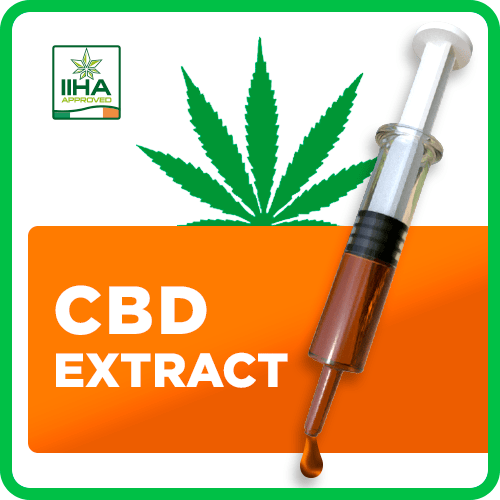
WHAT IS CBD?
Cannabidiol (CBD) is a chemical compound found in Hemp and Cannabis plants. CBD is thought to have potential utility for treating a wide range of symptoms and illnesses, including anxiety, inflammation, pain, seizures and even chronic addictions such as alcoholism.
In brief, CBD helps to support our body in maintaining homeostasis. It does this by interacting with our endocannabinoid system, a hugely important system in all human and animal bodies that is involved in helping to control functions such as your mood, your appetite, sleep and immune response by helping to bring about balance in our bodies.
CBD is a Phytocannabinoid discovered in 1940. It is one of at least 113 identified Cannabinoids in cannabis plants and accounts for up to 40% of the plant’s extract. CBD can be used in multiple ways including by inhalation of smoke or vaping e- liquid, by mouth in the most common form of CBD oil, in addition to capsules, dried cannabis, hemp tea, or in cream and balms etc.
CBD has no psychoactive effects and is not thought to alter a user’s state of mind. This makes the molecule attractive to those looking to medicate without the “stoned” feelings often associated with THC, particularly with those who suffer from anxiety. CBD is also generally considered to be safe at high doses and has not shown indications of causing dependency.
CBD is also being looked at closer at several academic research facilities for its potential anti-cancer properties.The first documented use of cannabis-derived medicine dates back to 2737 BC when Chinese Emperor Sheng Nung used a cannabis-infused tea to aid with a variety of ailments including memory, malaria, rheumatism and gout.
It wasn’t until 1839, when Irish physician and medical researcher, William B. O’Shaughnessy, published a study which investigated the plant’s therapeutic effects, that researchers did begin to consider the medical applications of cannabis.
While the Irish researcher may have not realised it then, he had just opened the door towards the discovery of the compounds that would one day be referred to as cannabinoids.
This brings us to the modern age and the possibility that Endocannabinoid Deficiency Syndrome (ECDS) could be the cause and rise of so many diseases and illnesses in this day and age.The Endocannabinoid system regulates our body’s homeostasis, a state of harmonic balance where everything works as it should.
After all.. When the Cannabis plant was ‘banned’ nearly 100 years ago they essentially removed Cannabinoids from the human diet – in essence what they did was deprive the human race of a what is now widely considered an essential micronutrient, or in simple terms – a Vitamin, that your body needs in small quantities for the proper functioning of its metabolism… A shocking coincidence?
WHAT IS ECDS?
Endocannabinoid Deficiency Syndrome (ECDS) is a condition where an individuals body produces a lower amount of cannabinoids than experts consider to be essential in the promotion of health, vitality, and well-being.
The theory of ECDS explains that these health conditions are due to a deficiency in Endocannabinoid levels, akin to the way neurotransmitter deficiencies are behind other illnesses – like serotonin deficiency in depression for example.The theory is that the cause of these syndromes is an insufficient amount of Cannabinoids in your body – its that simple.
The Endocannabinoid System (ECS) is present in every major bodily system, which is how its dysfunction can theoretically cause such a variety of conditions – and how cannabis manages so well to treat them!
Renowned cannabinoid researcher Dr. Ethan Russo first proposed the theory of Endocannabinoid deficiency in 2004. In a study, published in Neuro Endocrinology Letters, Russo suggested that deficient cannabinoid levels might explain why some conditions develop. Cannabinoids found in plants like hemp, including cannabidiol (CBD), are analogous to the Endocannabinoid’s naturally produced by the body. Research shows that they interact with the cannabinoid receptors of the Endocannabinoid system to elicit chemical responses that help bring about homeostasis.
While more research needs to be done before endocannabinoid deficiency can be proven beyond doubt, the theory could open the door for methods to prevent and manage certain conditions. Russo believes cannabinoids from cannabis plants like hemp are essential nutrients that can minimise certain diseases by assisting the endocannabinoid system and ensuring that it functions properly.The endocannabinoid system has been recently recognised as an important modulatory system in the function of brain, endocrine, and immune tissues. It appears to play a very important regulatory role in the secretion of hormones related to reproductive functions and response to stress.
You shouldn’t assume that your doctor is well versed in current medical cannabis literature. One way to find out his level of knowledge is to inquire if he or she has attended any education programs or workshops about cannabis recently.You shouldn’t be surprised if the answer is “no.”
So the next time you’re at the doctor’s, whether you suffer from a chronic illness, or not, think about asking your doctor what you can do to improve the health of your Endocannabinoid system.. And maybe put some pressure on them to find out!
